Abstract
OBJECTIVES--To investigate whether T-cell receptor (TCR) beta chain germline alleles, either alone or in combination with a particular HLA-genotype, are associated with rheumatoid arthritis (RA). METHODS--Three restriction fragment length polymorphisms (RFLPs), detected with TCR constant (TCRBC2) and variable (TCRBV8, TCRBV11) gene segments were analysed in a representative group of Belgian, HLA class II-typed patients with RA, and in a group of Belgian control subjects. RESULTS--The study confirmed the known association of RA with the HLA-DRB1*0401/0404 genotype (RR = 2.14, 95% CI = 1.16-4.00) in the Belgian RA population. This association was even more pronounced in the patients with more severe RA (RR = 3.26, 95% CI = 1.55-6.89). These data suggest that the HLA-DRB1*04 genotype can be used as a marker for disease severity. Similar frequencies in patients and controls were observed for all TCRB RFLPs studied, and this was in spite of subgrouping the RA population according to criteria for disease stratification. CONCLUSION--While a clear association with HLA DRB1*0401/0404 is observed, no interactive effects were seen with RA, DR4, TCRBC2 and TCRBV alleles, implying that the combined presence of these polymorphic markers does not cause an increased susceptibility to RA, and does not predispose for more aggressive RA, nor for familial aggregation of the disease. These results argue against the hypothesis that TCRB polymorphisms play a crucial role in the susceptibility for RA.
Full text
PDF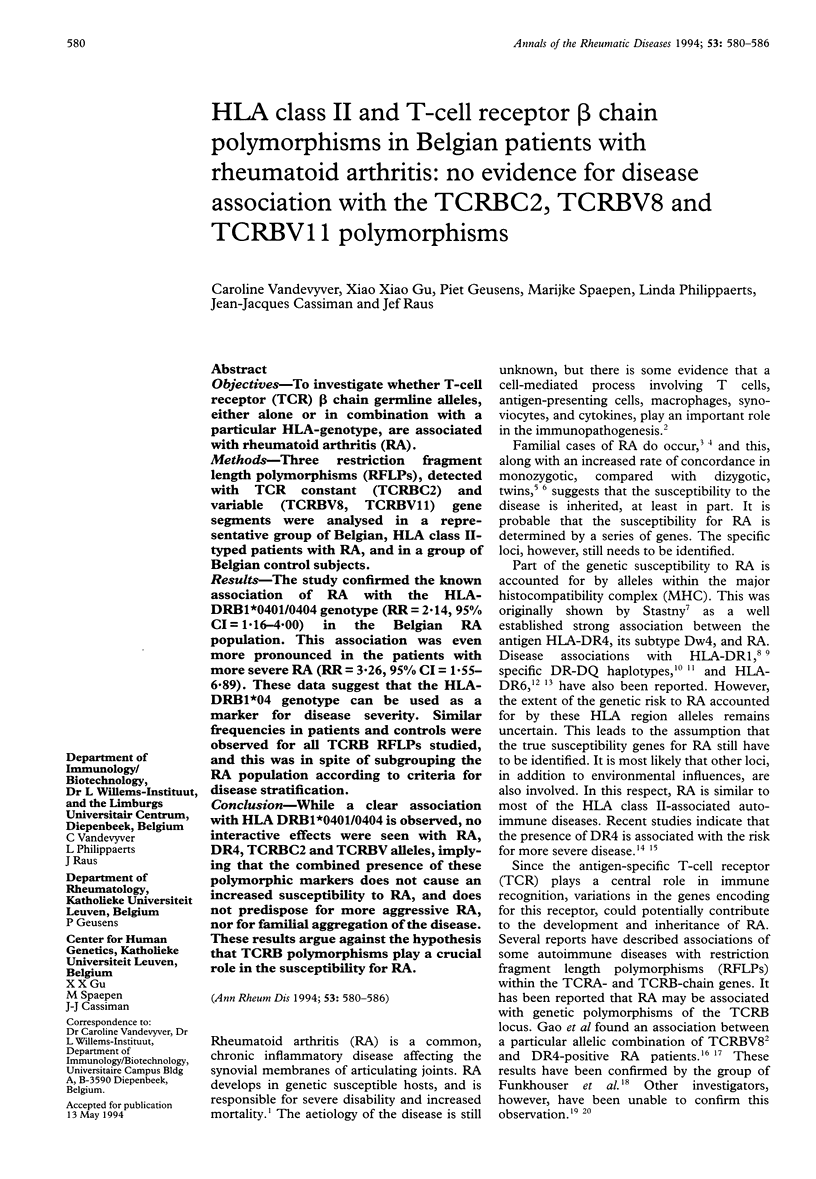
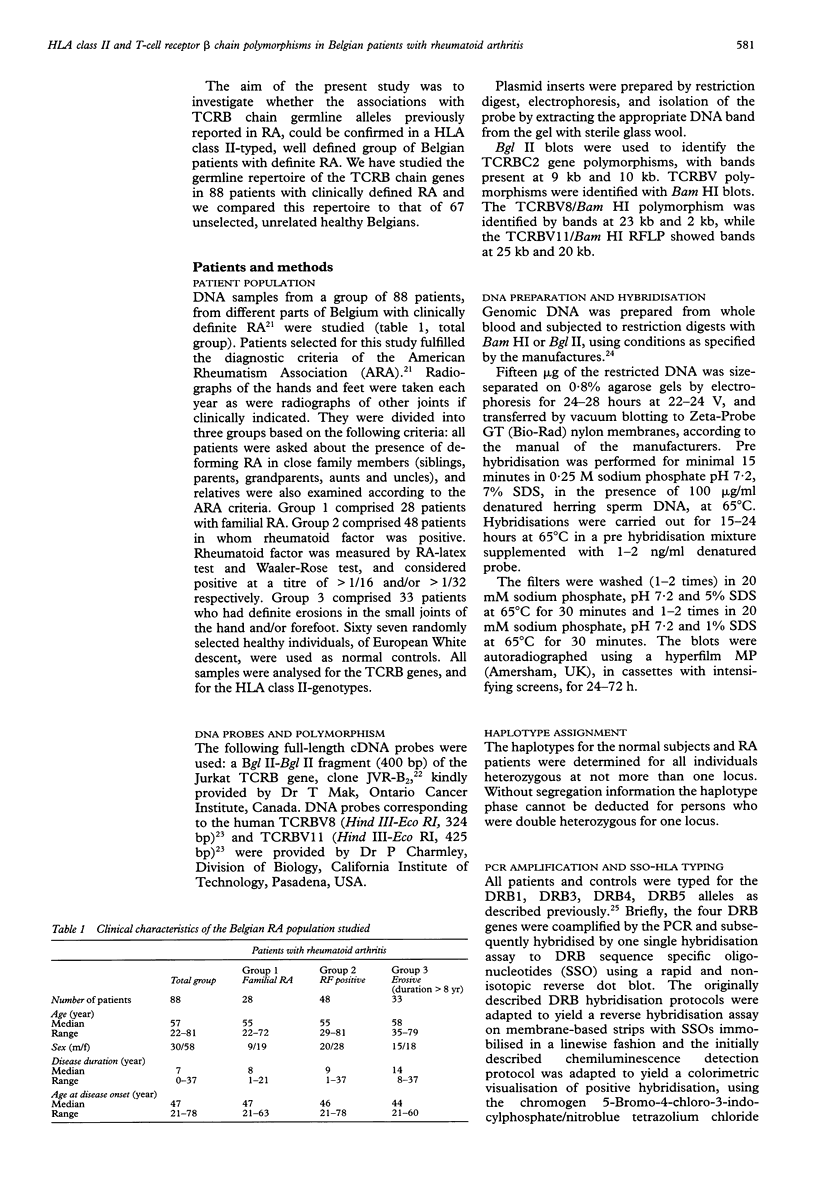
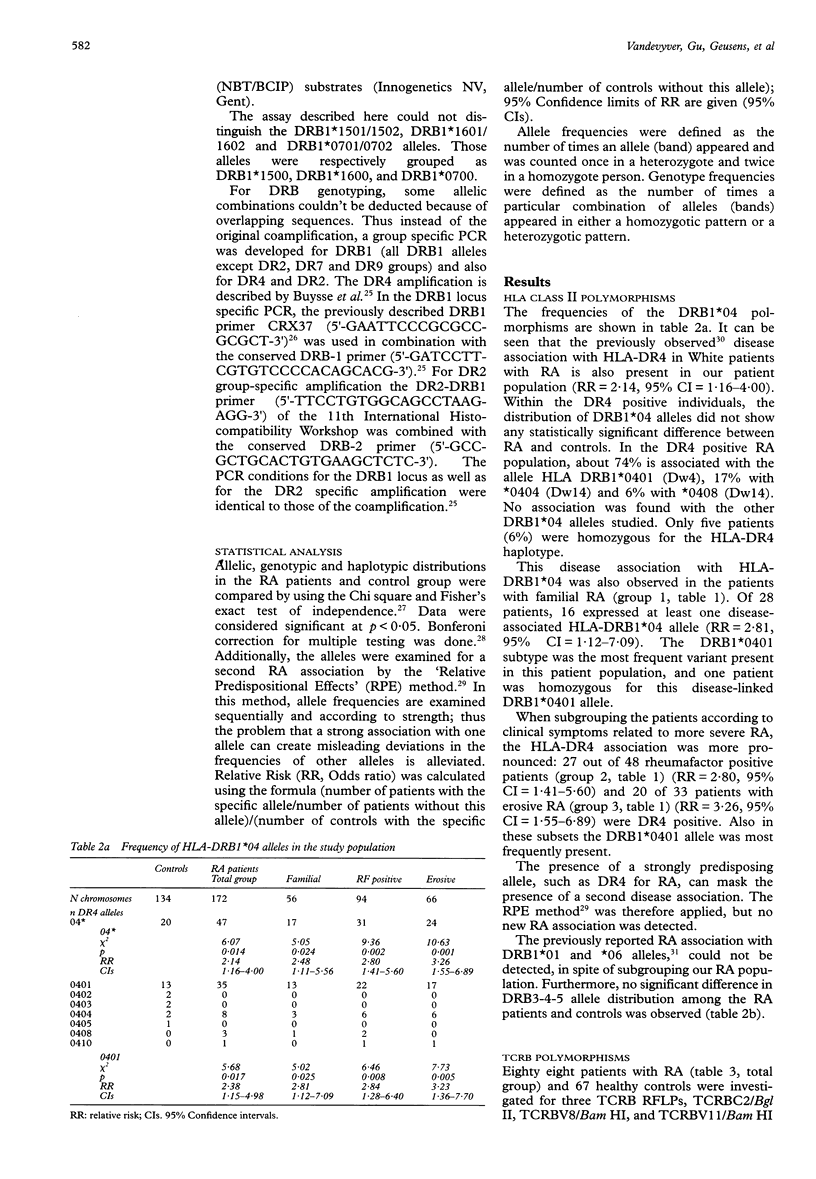
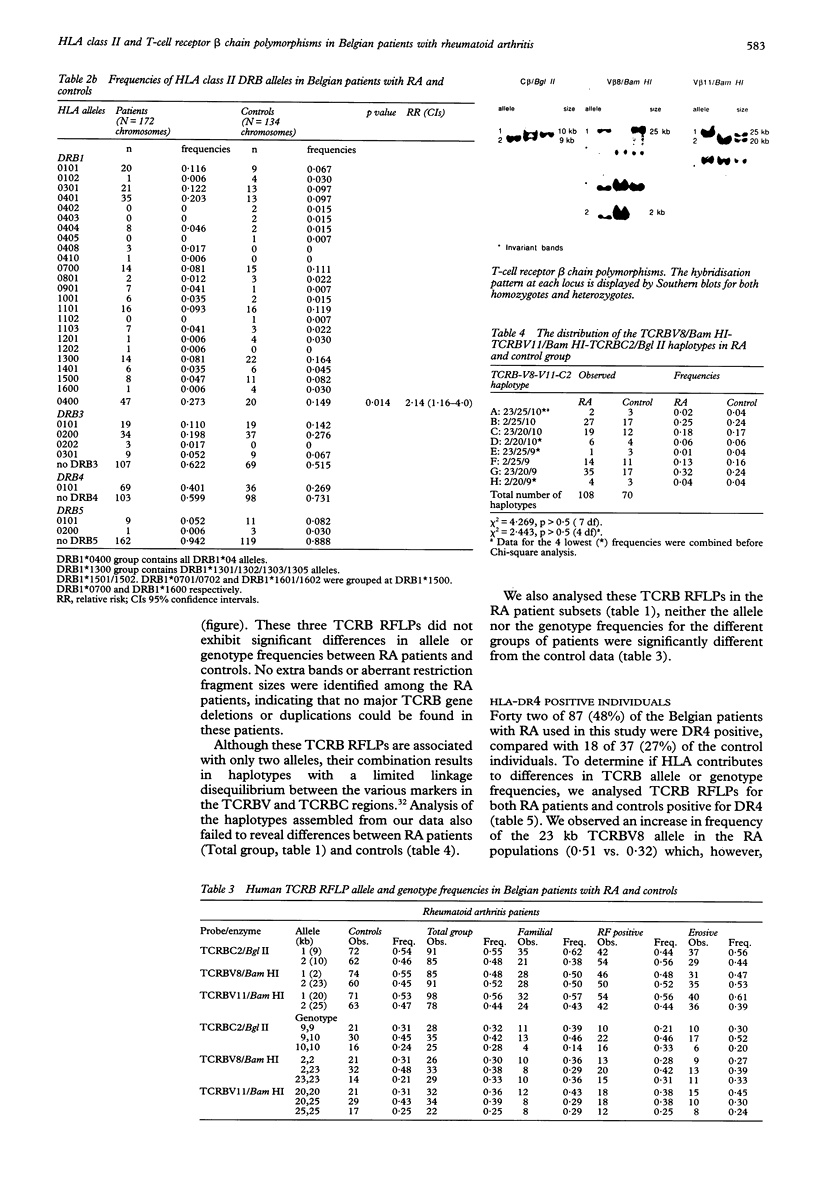
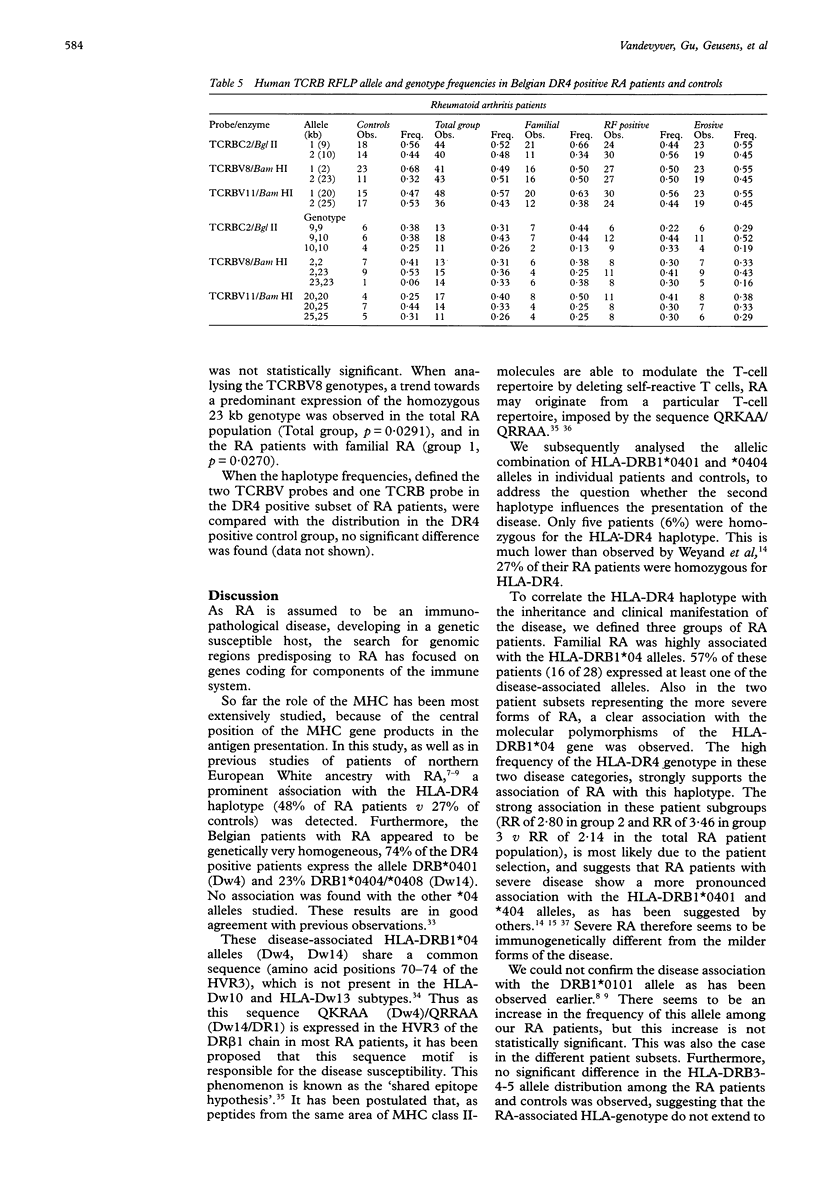
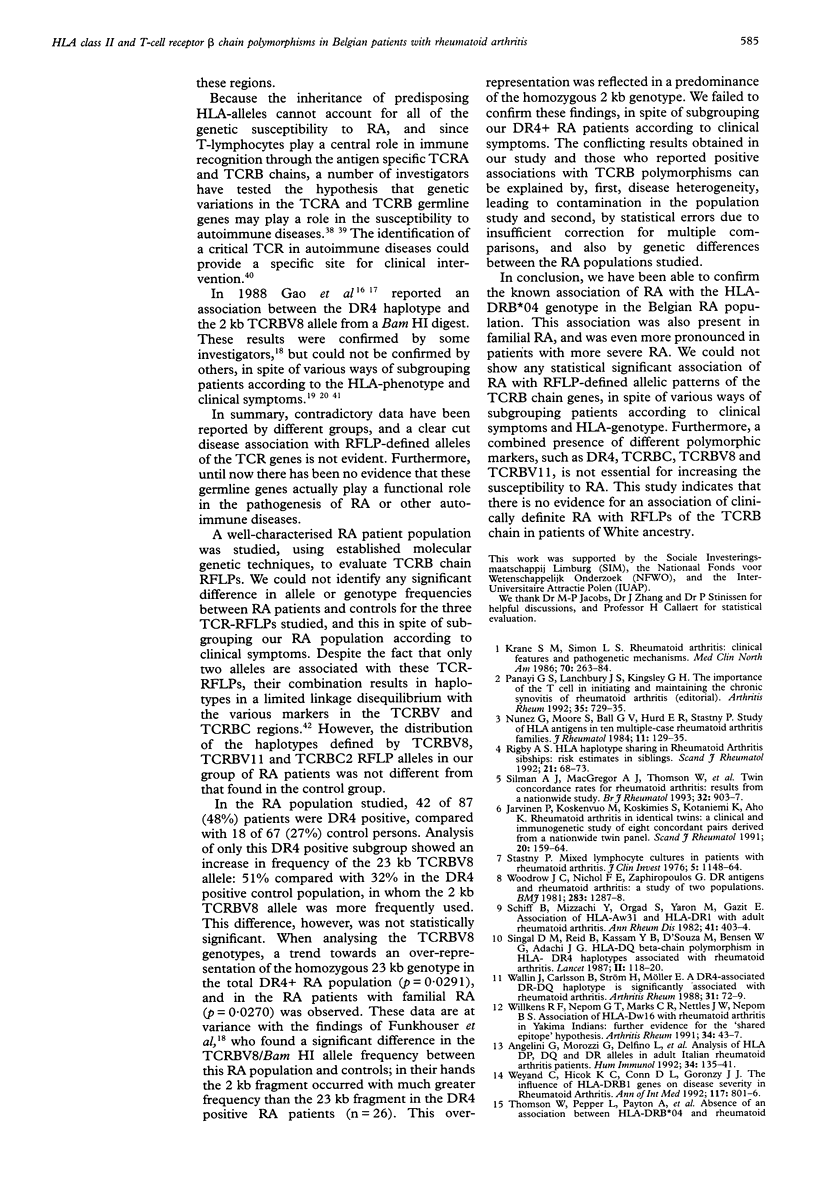
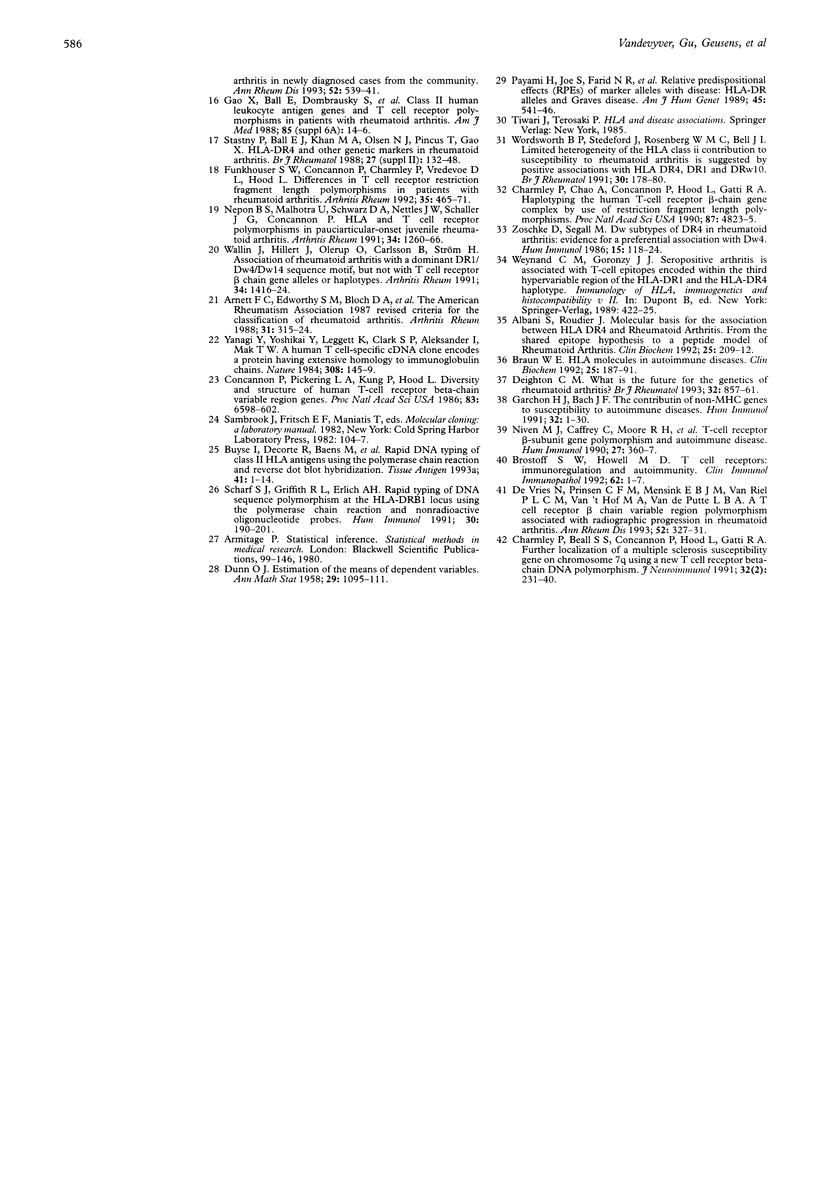
Selected References
These references are in PubMed. This may not be the complete list of references from this article.
- Albani S., Roudier J. Molecular basis for the association between HLA DR4 and rheumatoid arthritis. From the shared epitope hypothesis to a peptidic model of rheumatoid arthritis. Clin Biochem. 1992 Jun;25(3):209–212. doi: 10.1016/0009-9120(92)90328-p. [DOI] [PubMed] [Google Scholar]
- Angelini G., Morozzi G., Delfino L., Pera C., Falco M., Marcolongo R., Giannelli S., Ratti G., Ricci S., Fanetti G. Analysis of HLA DP, DQ, and DR alleles in adult Italian rheumatoid arthritis patients. Hum Immunol. 1992 Jun;34(2):135–141. doi: 10.1016/0198-8859(92)90039-p. [DOI] [PubMed] [Google Scholar]
- Arnett F. C., Edworthy S. M., Bloch D. A., McShane D. J., Fries J. F., Cooper N. S., Healey L. A., Kaplan S. R., Liang M. H., Luthra H. S. The American Rheumatism Association 1987 revised criteria for the classification of rheumatoid arthritis. Arthritis Rheum. 1988 Mar;31(3):315–324. doi: 10.1002/art.1780310302. [DOI] [PubMed] [Google Scholar]
- Braun W. E. HLA molecules in autoimmune diseases. Clin Biochem. 1992 Jun;25(3):187–191. doi: 10.1016/0009-9120(92)90289-5. [DOI] [PubMed] [Google Scholar]
- Buyse I., Decorte R., Baens M., Cuppens H., Semana G., Emonds M. P., Marynen P., Cassiman J. J. Rapid DNA typing of class II HLA antigens using the polymerase chain reaction and reverse dot blot hybridization. Tissue Antigens. 1993 Jan;41(1):1–14. doi: 10.1111/j.1399-0039.1993.tb01970.x. [DOI] [PubMed] [Google Scholar]
- Charmley P., Chao A., Concannon P., Hood L., Gatti R. A. Haplotyping the human T-cell receptor beta-chain gene complex by use of restriction fragment length polymorphisms. Proc Natl Acad Sci U S A. 1990 Jun;87(12):4823–4827. doi: 10.1073/pnas.87.12.4823. [DOI] [PMC free article] [PubMed] [Google Scholar]
- Concannon P., Pickering L. A., Kung P., Hood L. Diversity and structure of human T-cell receptor beta-chain variable region genes. Proc Natl Acad Sci U S A. 1986 Sep;83(17):6598–6602. doi: 10.1073/pnas.83.17.6598. [DOI] [PMC free article] [PubMed] [Google Scholar]
- Deighton C. M. What is the future for the genetics of rheumatoid arthritis? Br J Rheumatol. 1993 Oct;32(10):857–858. doi: 10.1093/rheumatology/32.10.857. [DOI] [PubMed] [Google Scholar]
- Funkhouser S. W., Concannon P., Charmley P., Vredevoe D. L., Hood L. Differences in T cell receptor restriction fragment length polymorphisms in patients with rheumatoid arthritis. Arthritis Rheum. 1992 Apr;35(4):465–471. doi: 10.1002/art.1780350417. [DOI] [PubMed] [Google Scholar]
- Gao X. J., Ball E. J., Dombrausky L., Olsen N. J., Pincus T., Khan M. A., Wolfe F., Stastny P. Class II human leukocyte antigen genes and T cell receptor polymorphisms in patients with rheumatoid arthritis. Am J Med. 1988 Dec 23;85(6A):14–16. doi: 10.1016/0002-9343(88)90373-7. [DOI] [PubMed] [Google Scholar]
- Garchon H. J., Bach J. F. The contribution of non-MHC genes to susceptibility to autoimmune diseases. Hum Immunol. 1991 Sep;32(1):1–30. doi: 10.1016/0198-8859(91)90113-n. [DOI] [PubMed] [Google Scholar]
- Järvinen P., Koskenvuo M., Koskimies S., Kotaniemi K., Aho K. Rheumatoid arthritis in identical twins: a clinical and immunogenetic study of eight concordant pairs derived from a nationwide twin panel. Scand J Rheumatol. 1991;20(3):159–164. doi: 10.3109/03009749109103016. [DOI] [PubMed] [Google Scholar]
- Krane S. M., Simon L. S. Rheumatoid arthritis: clinical features and pathogenetic mechanisms. Med Clin North Am. 1986 Mar;70(2):263–284. doi: 10.1016/s0025-7125(16)30953-1. [DOI] [PubMed] [Google Scholar]
- Niven M. J., Caffrey C., Moore R. H., Sachs J. A., Mohan V., Festenstein H., Hoover M. L., Hitman G. A. T-cell receptor beta-subunit gene polymorphism and autoimmune disease. Hum Immunol. 1990 Apr;27(4):360–367. doi: 10.1016/0198-8859(90)90086-5. [DOI] [PubMed] [Google Scholar]
- Nunez G., Moore S. E., Ball G. V., Hurd E. R., Stastny P. Study of HLA antigens in ten multiple-case rheumatoid arthritis families. J Rheumatol. 1984 Apr;11(2):129–135. [PubMed] [Google Scholar]
- Panayi G. S., Lanchbury J. S., Kingsley G. H. The importance of the T cell in initiating and maintaining the chronic synovitis of rheumatoid arthritis. Arthritis Rheum. 1992 Jul;35(7):729–735. doi: 10.1002/art.1780350702. [DOI] [PubMed] [Google Scholar]
- Payami H., Joe S., Farid N. R., Stenszky V., Chan S. H., Yeo P. P., Cheah J. S., Thomson G. Relative predispositional effects (RPEs) of marker alleles with disease: HLA-DR alleles and Graves disease. Am J Hum Genet. 1989 Oct;45(4):541–546. [PMC free article] [PubMed] [Google Scholar]
- Rigby A. S. HLA haplotype sharing in rheumatoid arthritis sibships: risk estimates in siblings. Scand J Rheumatol. 1992;21(2):68–73. doi: 10.3109/03009749209095070. [DOI] [PubMed] [Google Scholar]
- Scharf S. J., Griffith R. L., Erlich H. A. Rapid typing of DNA sequence polymorphism at the HLA-DRB1 locus using the polymerase chain reaction and nonradioactive oligonucleotide probes. Hum Immunol. 1991 Mar;30(3):190–201. doi: 10.1016/0198-8859(91)90034-7. [DOI] [PubMed] [Google Scholar]
- Schiff B., Mizrachi Y., Orgad S., Yaron M., Gazit E. Association of HLA-Aw31 and HLA-DR1 with adult rheumatoid arthritis. Ann Rheum Dis. 1982 Aug;41(4):403–404. doi: 10.1136/ard.41.4.403. [DOI] [PMC free article] [PubMed] [Google Scholar]
- Silman A. J., MacGregor A. J., Thomson W., Holligan S., Carthy D., Farhan A., Ollier W. E. Twin concordance rates for rheumatoid arthritis: results from a nationwide study. Br J Rheumatol. 1993 Oct;32(10):903–907. doi: 10.1093/rheumatology/32.10.903. [DOI] [PubMed] [Google Scholar]
- Stastny P. Mixed lymphocyte cultures in rheumatoid arthritis. J Clin Invest. 1976 May;57(5):1148–1157. doi: 10.1172/JCI108382. [DOI] [PMC free article] [PubMed] [Google Scholar]
- Thomson W., Pepper L., Payton A., Carthy D., Scott D., Ollier W., Silman A., Symmons D. Absence of an association between HLA-DRB1*04 and rheumatoid arthritis in newly diagnosed cases from the community. Ann Rheum Dis. 1993 Jul;52(7):539–541. doi: 10.1136/ard.52.7.539. [DOI] [PMC free article] [PubMed] [Google Scholar]
- Wallin J., Carlsson B., Ström H., Möller E. A DR4-associated DR-DQ haplotype is significantly associated with rheumatoid arthritis. Arthritis Rheum. 1988 Jan;31(1):72–79. doi: 10.1002/art.1780310111. [DOI] [PubMed] [Google Scholar]
- Wallin J., Hillert J., Olerup O., Carlsson B., Ström H. Association of rheumatoid arthritis with a dominant DR1/Dw4/Dw14 sequence motif, but not with T cell receptor beta chain gene alleles or haplotypes. Arthritis Rheum. 1991 Nov;34(11):1416–1424. doi: 10.1002/art.1780341112. [DOI] [PubMed] [Google Scholar]
- Weyand C. M., Hicok K. C., Conn D. L., Goronzy J. J. The influence of HLA-DRB1 genes on disease severity in rheumatoid arthritis. Ann Intern Med. 1992 Nov 15;117(10):801–806. doi: 10.7326/0003-4819-117-10-801. [DOI] [PubMed] [Google Scholar]
- Woodrow J. C., Nichol F. E., Zaphiropoulos G. DR antigens and rheumatoid arthritis: a study of two populations. Br Med J (Clin Res Ed) 1981 Nov 14;283(6302):1287–1288. doi: 10.1136/bmj.283.6302.1287. [DOI] [PMC free article] [PubMed] [Google Scholar]
- Yanagi Y., Yoshikai Y., Leggett K., Clark S. P., Aleksander I., Mak T. W. A human T cell-specific cDNA clone encodes a protein having extensive homology to immunoglobulin chains. Nature. 1984 Mar 8;308(5955):145–149. doi: 10.1038/308145a0. [DOI] [PubMed] [Google Scholar]
- Zoschke D., Segall M. Dw subtypes of DR4 in rheumatoid arthritis: evidence for a preferential association with Dw4. Hum Immunol. 1986 Jan;15(1):118–124. doi: 10.1016/0198-8859(86)90322-8. [DOI] [PubMed] [Google Scholar]
- de Vries N., Prinsen C. F., Mensink E. B., van Riel P. L., van't Hof M. A., van de Putte L. B. A T cell receptor beta chain variable region polymorphism associated with radiographic progression in rheumatoid arthritis. Ann Rheum Dis. 1993 May;52(5):327–331. doi: 10.1136/ard.52.5.327. [DOI] [PMC free article] [PubMed] [Google Scholar]


